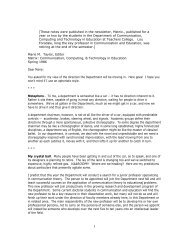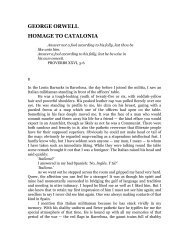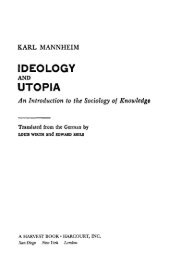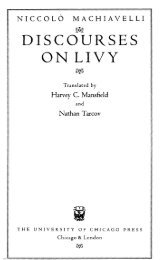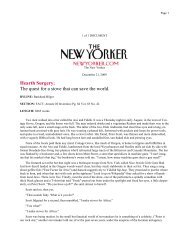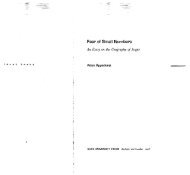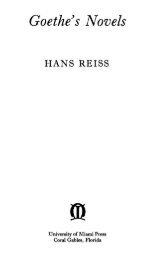THE REPUBLIC OF PLATO - Studyplace
THE REPUBLIC OF PLATO - Studyplace
THE REPUBLIC OF PLATO - Studyplace
Create successful ePaper yourself
Turn your PDF publications into a flip-book with our unique Google optimized e-Paper software.
PREFACE<br />
THIS version aims at conveying to the English reader as much<br />
as possible of the thought of the Republic in the most convenient<br />
and least misleading form. I have, accordingly, taken certain<br />
liberties, which it is reasonable to suppose that Plato would have<br />
sanctioned in an edition prepared for the modern press. The traditional<br />
division into ten 'books,' i.e. papyrus rolls, has been discarded,<br />
as an accidental expedient of ancient book-production, having<br />
little more to do with the structure of the argument than<br />
the division of every Victorian novel into three volumes had to<br />
do with the structure of the stories. The dialogue falls naturally<br />
into six main parts, and these I have subdivided, where minor<br />
breaks occur, into forty chapters. The notes prefixed to the chapters<br />
are designed to hold the thread of the argument and to explain<br />
matters which Plato could take for granted as within the common<br />
knowledge of his readers. The sole purpose is to bring out what<br />
Plato meant, not to attack or defend his opinions. These are better<br />
left to the judgement of the reader. For sympathetic and more<br />
detailed interpretation, the best guide known to me is R. L. Nettleship's<br />
Lectures on the Republic of Plato. Professor Ernest Barker's<br />
Greek Political Theory (1918) reviews all Plato's works and the<br />
speculations of his predecessors in this field. In Plato To-day Mr.<br />
R. H. S. Crossman has made a lively and provocative experiment<br />
in confronting Plato with the political problems of the present day.<br />
Some authors can be translated almost word for word. The reader<br />
may fairly claim to be told why this method cannot do justice to<br />
the matter and the manner of Plato's discourse. In brief, the answer<br />
is that in many places the effect in English is misleading, or tedious,<br />
or grotesque and silly, or pompous and verbose. Since no scholar<br />
would apply most of these epithets to the original, there must be<br />
something wrong with the current practice of translators.<br />
Many key-words, such as 'music,' 'gymnastic,' 'virtue,' 'philov



